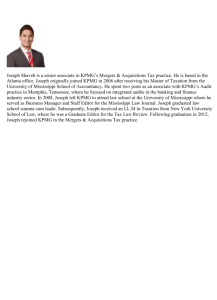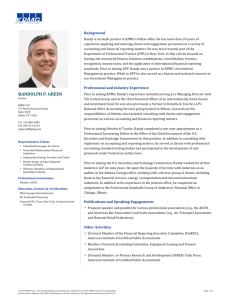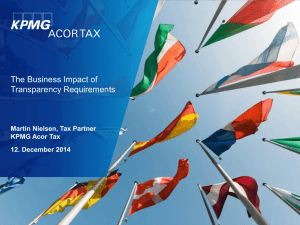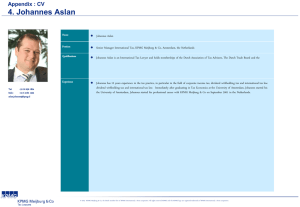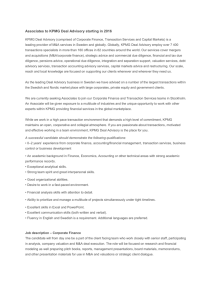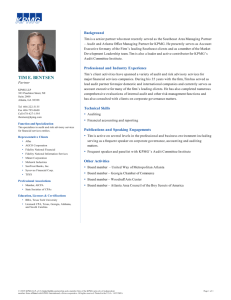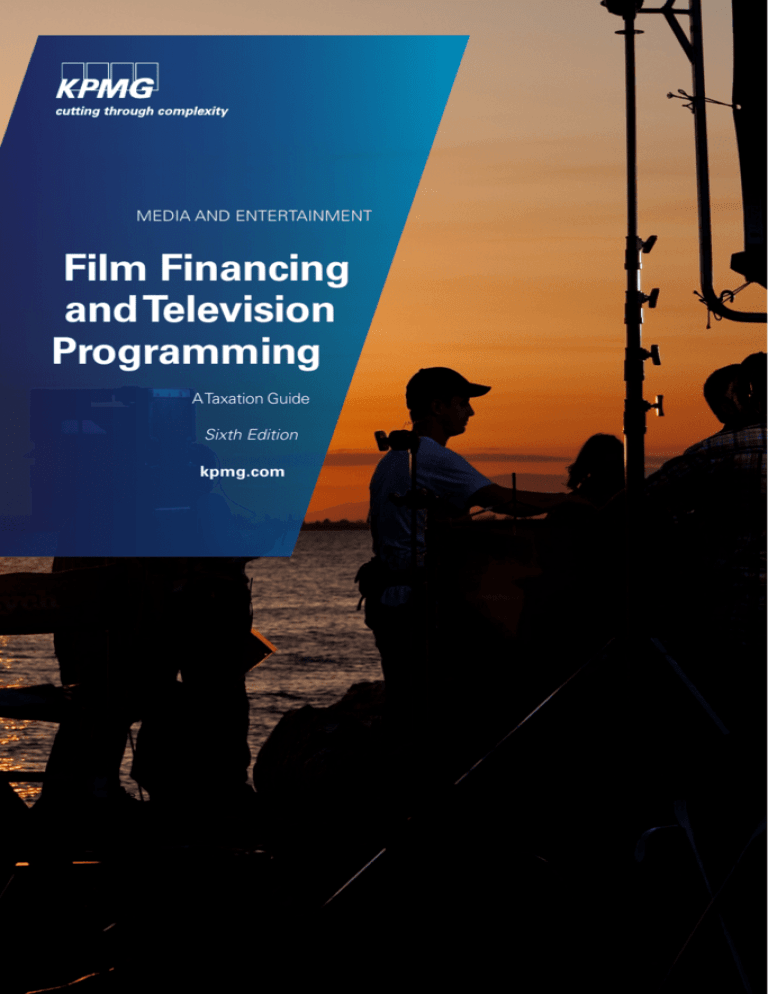
MEDIA AND ENTERTAINMENT
Film Financing
and Television
Programming
A Taxation Guide
Sixth Edition
kpmg.com
Contents
Preface
1
Chapter 01 | Australia3
Chapter 02 | Austria30
Chapter 03 | Belgium39
Chapter 04 | Brazil59
Chapter 05 | Canada76
Chapter 06 | China and Hong Kong SAR124
China (124-135)
Hong Kong SAR (136-144)
Chapter 07 | Colombia145
Chapter 08 | Czech Republic
154
Chapter 09 | Fiji166
Chapter 10 | France183
Chapter 11 | Germany200
Chapter 12 | Greece219
Chapter 13 | Hungary254
Chapter 14 | Iceland268
Chapter 15 | India279
Chapter 16 | Indonesia303
Chapter 17 | Ireland309
Chapter 18 | Italy335
Chapter 19 | Japan352
Chapter 20 | Luxembourg362
Chapter 21 | Malaysia377
Chapter 22 | Mexico385
Chapter 23 | The Netherlands411
Chapter 24 | New Zealand436
Chapter 25 | Norway453
Chapter 26 | Philippines474
Chapter 27 | Poland489
Chapter 28 | Romania499
Chapter 29 | Singapore516
Chapter 30 | South Africa532
Chapter 31 | South Korea550
Chapter 32 | Sweden556
Chapter 33 | Thailand566
Chapter 34 | United Kingdom578
Chapter 35 | United States606
Appendix A
Table of Film and TV Royalty
Withholding Tax Rates
637
Appendix B
Table of Dividend Withholding
Tax Rates
645
Appendix C
Table of Interest Withholding
Tax Rates
659
ANY TAX ADVICE IN THIS COMMUNICATION IS NOT INTENDED OR
WRITTEN BY KPMG LLP TO BE USED, AND CANNOT BE USED, BY A
CLIENT OR ANY OTHER PERSON OR ENTITY FOR THE PURPOSE OF
(i) AVOIDING PENALTIES THAT MAY BE IMPOSED ON ANY TAXPAYER OR
(ii) PROMOTING, MARKETING OR RECOMMENDING TO ANOTHER PARTY
ANY MATTERS ADDRESSED HEREIN.
1
Film Financing and Television Programming
Preface
Preface
KPMG LLP’s (KPMG) Film Financing and Television Programming: A Taxation
Guide, now in its sixth edition, is a fundamental resource for film and television
producers, attorneys, tax, and finance executives involved with the commercial
side of film and television production. The guide is recognized as a valued
reference tool for motion picture and television industry professionals.
Its primary focus is on the tax and business needs of the film and television
industry with information drawn from the knowledge of KPMG International’s
global network of media and entertainment Tax professionals.
KPMG published the first guide more than 15 years ago as a resource for global
coverage of incentives and tax updates as they apply to the film and television
industry. Subsequent editions expanded into coverage of financing techniques,
credits/incentives, and a thorough appendix of withholding tax rates–a valuable
reference tool for all finance and tax professionals.
Each chapter of the sixth edition focuses on a single country and provides a
description of commonly used financing structures in film and television, as
well as their potential commercial and tax implications for the parties involved.
Additionally, the United States chapter focuses on both federal and state
incentives, highlighting the states that offer the more popular and generous tax
and financial incentives. Key sections in each chapter include:
Introduction
A thumbnail description of the country’s film and television industry contacts,
regulatory bodies, and financing developments and trends.
Key Tax Facts
At-a-glance tables of corporate, personal, and VAT tax rates; normal non‑treaty
withholding tax rates; and tax year-end information for companies and
individuals.
Financing Structures
Descriptions of commonly used financing structures in film and television in the
country and the potential commercial tax implications for the parties involved. The
section covers rules surrounding co-productions, partnerships, equity tracking
shares, sales and leaseback, subsidiaries, and other tax-effective structures.
Tax and Financial Incentives
Details regarding the tax and financial incentives available from central and local
governments as they apply to investors, producers, distributors, and actors, as
well as other types of incentives offered.
Corporate Tax
Explanations of the corporate tax in the country, including definitions, rates, and
how they are applied.
© 2012 KPMG LLP, a Delaware limited liability partnership and the U.S. member firm of the KPMG network of independent member firms affiliated
with KPMG International Cooperative (“KPMG International”), a Swiss entity. All rights reserved. Printed in the U.S.A. The KPMG name, logo and
“cutting through complexity” are registered trademarks or trademarks of KPMG International. 25112NSS
Film Financing and Television Programming
Preface
2
Personal Tax
Personal tax rules from the perspective of investors, producers, distributors,
artists, and employees.
Appendices
Additionally, withholding tax tables setting forth the non-treaty and treaty‑based
dividend, interest, and film royalty withholding tax rates for the countries
surveyed are included as an appendix and can be used as a preliminary source
for locating the applicable withholding rates between countries.
KPMG and Member Firm Contacts
References to KPMG and KPMG International member firm contacts at the end
of each chapter are provided as a resource for additional detailed information.
The sixth edition of KPMG’s Film and Television Tax Guide is available in
an online PDF format at www.kpmg.com/filmtax and on CD. The guide is
searchable by country.
Please note: While every effort has been made to provide up-to-date
information, tax laws around the world are constantly changing. Accordingly, the
material contained in this book should be viewed as a general guide only and
should not be relied upon without consulting your KPMG or KPMG International
member firm Tax advisor.
Finally, we would sincerely like to thank all of the KPMG International member
firm Tax professionals from around the world who contributed their time and
effort in compiling the information contained in this book and assisting with
its publication. Production opportunities are not limited to the 35 countries
contained in this guide. KPMG and the other KPMG International member
firms are in the business of identifying early-stage emerging trends to assist
clients in navigating new business opportunities. We encourage you to consult
a KPMG or KPMG International member firm Tax professional to continue the
conversation about potential approaches to critical tax and business issues
facing the media and entertainment industry.
Thank you and we look forward to helping you with any questions you may have.
Tony Castellanos
+1 212.954.6840
acastellanos@kpmg.com
Benson Berro
+1 818.227.6954
bberro@kpmg.com
January 2012
© 2012 KPMG LLP, a Delaware limited liability partnership and the U.S. member firm of the KPMG network of independent member firms affiliated
with KPMG International Cooperative (“KPMG International”), a Swiss entity. All rights reserved. Printed in the U.S.A. The KPMG name, logo and
“cutting through complexity” are registered trademarks or trademarks of KPMG International. 25112NSS
303
Film Financing and Television Programming
Indonesia
Chapter 16
Indonesia
Introduction
In an attempt to attract foreign investors, increase tax collection and provide
a more neutral, simple and transparent tax environment, the Indonesian
government revised the tax administration, income tax and Value Added Tax
laws in 2007, 2008 and 2009 respectively.
In addition, the Indonesian government has also entered into tax treaties
with several countries. As of August 2011, Indonesia has tax treaties with
59 countries.
Unfortunately, the filmmaking industry is still closed to foreign investors but
for establishing a company that engages in providing technical assistance
to the filmmaking industry, it is opened with a foreign ownership limitation
(49% maximum of foreign ownership), such as establishing a film studio, film
processing, dubbing and editing. Film companies may hire foreign artists or
employ foreign technical assistance services etc. As there are no specific
regulations on the film industry, ordinary tax provisions operate.
Key Tax Facts
Corporate income tax rate
25%
Highest personal income tax rate
30%
Value added tax rate
10%
Normal non-treaty withholding tax rates: Dividends
20%
Interest
20%
Royalties
20%
Tax year-end: Companies
12-month period
Tax year-end: Individuals
December 31
The tax year-end for companies is determined based on the company’s policy
as long as the fiscal year covers a 12-month period.
Film Financing
Financing Structures
Apart from borrowing from local banks, the film industry may borrow
from overseas banks or private lenders by utilizing the available tax treaty
protection. There are no specific tax regulations on film industry financing.
Interest payable on loans and other forms of business debt can generally be
deducted for tax purposes. However, the loan principal cannot be deducted
in calculating taxable profit.
© 2012 KPMG LLP, a Delaware limited liability partnership and the U.S. member firm of the KPMG network of independent member firms affiliated
with KPMG International Cooperative (“KPMG International”), a Swiss entity. All rights reserved. Printed in the U.S.A. The KPMG name, logo and
“cutting through complexity” are registered trademarks or trademarks of KPMG International. 25112NSS
Film Financing and Television Programming
Indonesia
304
Other Financing Considerations
Stamp Duties
Stamp duty of 6,000 Indonesian Rupiah (IDR) applies for each commercial
document entered into, such as agreements, commercial papers and
invoices.
Exchange Controls and Regulatory Rules
There are no specific exchange controls or other regulatory rules in
Indonesia. However, there is a requirement by the Indonesian Central Bank
to report the purpose of any transfer made to an overseas recipient. In
addition, when purchasing US$100,000 or more (or its equivalent) in a single
month, the purchaser should attach their tax ID number, state the purpose of
the purchase and a statement that the purpose of the purchase is accurate in
their report.
Other than the above, there is nothing to prevent the repatriation of income
arising in Indonesia back to foreign lenders or foreign artists.
Corporate Taxation
Indonesian companies are subject to corporate tax of 25 percent from 2010
onwards. Taxable income is calculated based on the commercial income
statement after adjustments for non-taxable income and non-deductible
expenses. Interest expense is generally deductible for the purposes of
calculating the corporate tax payable.
Film Distribution Company
If an Indonesian company acquires distribution rights by way of a lump-sum
payment from another production company (local or overseas), the payment
for the acquisition of the rights is normally treated as an expense in earning
profits. The expense is not regarded as the purchase of an intangible asset
but as a royalty payment. If such rights cover several years the royalty
payment should be amortized in calculating the corporate tax payable.
Where the recipient of payments is a non-resident, payments for distribution
rights are subject to domestic regulation withholding tax of 20 percent.
However, if the recipient resides in a tax treaty country, the withholding tax
rate can be reduced by the relevant treaty.
© 2012 KPMG LLP, a Delaware limited liability partnership and the U.S. member firm of the KPMG network of independent member firms affiliated
with KPMG International Cooperative (“KPMG International”), a Swiss entity. All rights reserved. Printed in the U.S.A. The KPMG name, logo and
“cutting through complexity” are registered trademarks or trademarks of KPMG International. 25112NSS
305
Film Financing and Television Programming
Indonesia
Examples of the relevant treaty royalty withholding rates are as follows:
U.S.
10%
U.K.
15%
Netherlands
10%
Japan
10%
Singapore
15%
Malaysia
10%
Thailand
15%
The income arising from exploiting such rights is normally recognized as
trading income. A distribution company will be taxed on the income derived
from the exploitation of any of its acquired films, wherever and however
these are sublicensed, provided the parties are not connected. If they are
connected, the tax authorities may question the level of income returned.
Other Expenditure
As there are no specific tax regulations for a film distribution company or a
film production company, they are subject to the ordinary rules applicable to
other companies. For example, in calculating taxable income, as most dayto-day business expenditure such as the cost of film rights, salaries, rents,
advertising, travel expenses, and legal and professional costs normally relate
to the business, they may be deducted.
Certain other expenditure cannot be deducted, for example, any bad debt
provisions, employees’ benefits in-kind, depreciation of luxury vehicles etc.
Capital expenditure, such as the purchase of land and buildings, equipment
and motor vehicles should be depreciated. For tax purposes, the useful life
of the assets is categorized as either 4 years, 8 years, 16 years or 20 years
depending on the type of assets.
Losses
Tax losses can be carried forward up to a maximum 5 years.
Indirect Taxation
Value Added Tax
Value Added Tax (VAT) of 10 percent is payable by an entity on taxable
supplies it delivers (output VAT). Most services, including royalty and
professional services, and goods are subject to VAT in Indonesia, including
film distribution income. Interest is not subject to VAT. Export of goods is
subject to VAT at 0 percent.
© 2012 KPMG LLP, a Delaware limited liability partnership and the U.S. member firm of the KPMG network of independent member firms affiliated
with KPMG International Cooperative (“KPMG International”), a Swiss entity. All rights reserved. Printed in the U.S.A. The KPMG name, logo and
“cutting through complexity” are registered trademarks or trademarks of KPMG International. 25112NSS
Film Financing and Television Programming
Indonesia
306
An entity is also entitled to claim tax credits for the VAT component (input
VAT) of its local purchases and imports of goods and services against the VAT
payable. If the input VAT is higher than the output VAT, the excess may be
carried forward to the following month to be compensated with the output
VAT. A refund application is also allowed.
Utilizing overseas services and payments of royalties to overseas recipients
is subject to self-assessed VAT at 10 percent. This is treated similar to input
VAT on local purchases.
Non residents cannot register for VAT purposes in Indonesia.
Customs Duties
Importation of cinematographic film, exposed and developed, is subject to
customs duty of 10 percent. Customs duty on publicity, advertising, and
promotional materials will depend upon the particular type of good. For
example, some advertising material is free of customs duty while other
material is generally subject to a customs duty of 5 percent. The value of
the customs duty and VAT is calculated at the time of importation and is the
customs value, plus overseas freight and insurance.
Personal Taxation
Non-Resident Artists (self-employed)
Income Tax Implications
Subject to its double tax treaties, Indonesia taxes the income earned by a
non-resident artist from a performance in Indonesia and any other activities
carried on in Indonesia.
If a non-resident artist receives any payment arising from or in consequence
of an Indonesian activity, the Indonesian payer is obliged to deduct
withholding tax and account for this tax to the authorities. This withholding
tax obligation also applies to payments made to related support staff (e.g.
choreographer, costume designer, director, director of photography, film
editor, musical director, producer, production designer or set designer) who
are not engaged as employees. The rate of withholding for payments to
entertainers and their associates that are individuals is 20 percent under the
local regulation.
© 2012 KPMG LLP, a Delaware limited liability partnership and the U.S. member firm of the KPMG network of independent member firms affiliated
with KPMG International Cooperative (“KPMG International”), a Swiss entity. All rights reserved. Printed in the U.S.A. The KPMG name, logo and
“cutting through complexity” are registered trademarks or trademarks of KPMG International. 25112NSS
307
Film Financing and Television Programming
Indonesia
Indonesia’s double tax agreements provide the following rules:
U.S.
U.S. artists are taxable in Indonesia where the payment for
remuneration, including expense reimbursements, exceeds
US$ 2,000 in any consecutive 12-month period, except under
cultural agreement between Governments (Article 17)
U.K.
U.K. resident artists are taxable in Indonesia to the extent
which they perform services in Indonesia, except under
cultural agreement between Governments or where the visit is
supported by Government funds (Article 17)
Netherlands
Dutch resident artists are taxable in Indonesia to the extent to
which they perform services in Indonesia (Article 18)
Japan
Japanese resident artists are taxable in Indonesia to the
extent which they perform services in Indonesia, except under
cultural agreement between Governments or where the visit is
supported by Government funds (Article 17)
Singapore
Singapore resident artists are taxable in Indonesia to the extent
to which they perform services in Indonesia, except where the
visit is supported by Government funds (Article 16)
Malaysia
Malaysian resident artists are taxable in Indonesia to the extent
to which they perform services in Indonesia, except where the
visit is supported by Government funds (Article 16)
Thailand
Thai resident artists are taxable in Indonesia to the extent to
which they perform services in Indonesia, except where the
visit is supported by Government funds (Article 17)
Resident Artists (self-employed)
Resident artists are taxable as individuals.
Employees
Income Tax Implications
Employers are obliged to make regular, periodic payments to the Indonesian tax
authorities in respect of employees’ personal tax liabilities arising from salaries
or wages paid to them. Deductions are made for the non-taxable income band
based on the number of dependents (to a maximum of three). The progressive
withholding tax rates applicable for the 2009 fiscal year onwards are between
5 percent and 30 percent for annual income which exceeds 500 million IDR.
Social Security Implications
Employers are liable for social security contributions (Jamsostek) in respect
of payments of salaries or wages. Currently the minimum Jamsostek
contribution is 6.24 percent from employees’ regular monthly remuneration
of which 2 percent should be borne by employees.
© 2012 KPMG LLP, a Delaware limited liability partnership and the U.S. member firm of the KPMG network of independent member firms affiliated
with KPMG International Cooperative (“KPMG International”), a Swiss entity. All rights reserved. Printed in the U.S.A. The KPMG name, logo and
“cutting through complexity” are registered trademarks or trademarks of KPMG International. 25112NSS
Film Financing and Television Programming
Indonesia
308
KPMG Contacts
KPMG’s Media and Entertainment tax network members:
Abraham Pierre
KPMG Hadibroto
33rd Floor Wisma GKBI
Jakarta 10210
Indonesia
Phone: +62 21 570 4888
Direct: +62 21 5799 5150
Fax:
+62 21 570 5888
© 2012 KPMG LLP, a Delaware limited liability partnership and the U.S. member firm of the KPMG network of independent member firms affiliated
with KPMG International Cooperative (“KPMG International”), a Swiss entity. All rights reserved. Printed in the U.S.A. The KPMG name, logo and
“cutting through complexity” are registered trademarks or trademarks of KPMG International. 25112NSS

